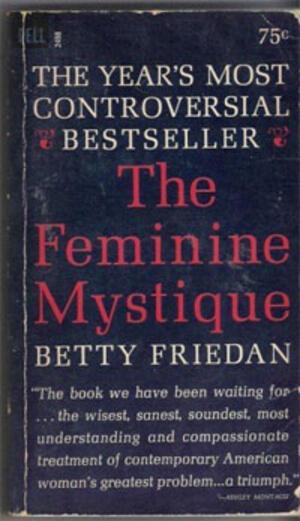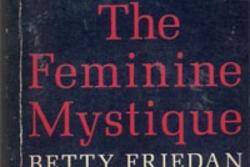The Feminine Mystique: Betty Friedan, A Generation of Readers, and You
The story of The Feminine Mystique is of course the story of Betty Friedan, but it is also the story of every woman, young and old, who read the book and came away from it a changed person. This week, we celebrate the anniversary of its landmark publication in 1963, and its profound impact on the budding feminist movement of the time, as well as on subsequent generations of readers.
Following are a few personal reflections from women who were touched by The Feminine Mystique in ways that continue to guide their lives and their work.
“The Feminine Mystique was one of three books that all freshman were told to read before they came to campus, Wellesley College, fall of 1963. … I did not know, at the age of 17, what I was reading, but I do know that I had never read a book so focused on women—not Little Women women, not Alice in Wonderland, not Emily up in her room writing poetry, but real, live women and what might be going on in their lives. That book was a beginning for me, and I always reference that time and that book.” —Susan Levin Schlechter , JWA Board Member
“I read The Feminine Mystique in 1967, when I was 17 years old. It did not [inspire] me to burn my bra, hate my father, brother or boyfriend, or demand more equality. What it DID do was to make me realize how very important being involved in community, reaching beyond myself, and being aware of all that was going on around me was. This involvement led me to who I have been my whole adult life: aware of causes, aware of inequalities of all kinds, and aware of who I could be.” —Susan Raskin, JWA Board Member
“In 1963, the mother of two preschoolers living in the high desert of California, I felt trapped and isolated, unable to go out for weeks because of spring sandstorms and no car available. I had everything most folks want—supportive husband, wonderful little girls, a cheerful rented home with backyard, washer/dryer and dishwasher, good food, yet unhappy and dissatisfied with my lifestyle. I felt guilty: I have everything, I thought; what right do I have to be unhappy?
One Sunday morning, I heard the beginning of a radio interview of a woman who had just written a book called The Feminine Mystique. All over America, she said, there are women who have the appurtenances of what most people want, happy homes, enough to eat, etc., yet they feel dissatisfaction and that they're cut off from the mainstream of life. She explained that many of these had the beginnings of careers before having children or find themselves limited at work for advancement. They ask themselves, "Why am I unhappy, and how can it be when I have what most people want?"
I jumped out and yelled to my husband, "That's me! She's talking about me!" I learned how this concept called feminism was bringing together women such as me to tackle a challenge that could be fixed. Betty Friedan brought a reality check into the life of this college graduate, previously a New York editor and political activist, now isolated in desert sandstorms in a place where women had to iron their husbands' shirts because there were no corner laundries. I belonged to this fellowship of women and men working for full equality and opportunity, and there was nothing I had to feel guilty about. Thanks to Betty and Germaine Greer and the eloquent, knowledgeable sisters who helped us reframe and move forward.” —Dolores Sloan, writer/presenter
What did The Feminine Mystique mean to you? Leave your stories in the comments section below, and be a part of our conversation.






